Resignation Letter Not Satisfied Salary
[Your Name]
[Your Address]
[City, State, Zip Code]
[Email Address]
[Phone Number]
[Today's Date]
[Recipient's Name]
[Company Name]
[Company Address]
[City, State, Zip Code]
Dear [Recipient's Name],
I hope this letter finds you well. I am writing to formally submit my resignation from my position at [Company Name], effective [last working day, typically two weeks from the date of the letter]. It has been a difficult decision for me, as I have truly appreciated the opportunities and experiences I have had while working here.
However, after careful consideration and reflection, I have come to the conclusion that I must explore other opportunities due to my dissatisfaction with my current salary. While I have thoroughly enjoyed my time at [Company Name] and have learned a great deal, I believe that my contributions and dedication have not been adequately reflected in my compensation.
I have discussed my concerns about the salary issue with my immediate supervisor on several occasions, but unfortunately, we have not been able to reach a mutually satisfactory resolution. As a result, I feel it is in my best interest to pursue new opportunities that align more closely with my professional and financial goals.
I want to express my sincere gratitude to you and the entire team at [Company Name] for the support, mentorship, and camaraderie I have experienced during my tenure here. I am proud of the contributions I have made to the company and will do my best to ensure a smooth transition of my responsibilities during my remaining time here.
Please let me know if there is anything specific I can do to assist in this transition process. I am more than willing to help train my replacement or provide any necessary documentation to facilitate the handover.
Thank you once again for the valuable experience and for understanding my decision. I wish [Company Name] continued success and growth in the future.
Sincerely,
[Your Name]
Professional Resignation Letter Due to Unsatisfactory Salary
Subject: Resignation Notice
Dear [Manager's Name],
I am writing to formally resign from my position at [Company Name], effective [Last Working Day]. Despite my dedication and contribution, I have found that the current salary does not align with my expectations and responsibilities.
I am grateful for the opportunities and experiences I have gained during my tenure and will ensure a smooth transition of my duties before my departure.
Sincerely,
[Your Name]
Heartfelt Resignation Letter Over Salary Concerns
Subject: Resignation Effective [Date]
Dear [Manager's Name],
It is with a heavy heart that I submit my resignation from [Company Name], effective [Last Working Day]. I have enjoyed my time here and value the relationships I have built, but the current salary structure does not meet my financial needs.
I hope the company continues to prosper, and I am committed to supporting a smooth handover process.
Warm regards,
[Your Name]
Formal Email Resignation for Salary Dissatisfaction
Subject: Resignation Notification – [Your Name]
Dear [Manager's Name],
I am writing to inform you of my resignation from [Company Name], effective [Last Working Day]. After careful consideration, I have decided that the current compensation package does not reflect my contributions and professional expectations.
Thank you for your support during my tenure. I will assist in transitioning my responsibilities to ensure minimal disruption.
Best regards,
[Your Name]
Casual Resignation Message Regarding Pay
Subject: Leaving [Company Name]
Hi [Manager's Name],
I wanted to let you know that I will be resigning from [Company Name], with my last day being [Last Working Day]. I’ve enjoyed working here but feel that the salary does not meet my needs.
I’m happy to help with the transition over the next few weeks. Thanks for all the support.
Cheers,
[Your Name]
Provisional Resignation Letter Over Unsatisfactory Compensation
Subject: Notice of Resignation
Dear [Manager's Name],
Please accept this letter as notice of my intention to resign from [Company Name], effective [Last Working Day]. I have attempted to address my concerns regarding compensation but have not seen a satisfactory resolution.
I am willing to discuss a handover plan to ensure a smooth transition of my responsibilities.
Sincerely,
[Your Name]
Quick Resignation Email for Salary Issues
Subject: Resignation – [Your Name]
Dear [Manager's Name],
I am resigning from my position at [Company Name], effective [Last Working Day], due to unsatisfactory salary terms. I appreciate the experiences and support during my time here.
Regards,
[Your Name]
What a Resignation Letter Over Unsatisfactory Salary Is and Why You Need It
- A formal notification to the employer about leaving a job due to inadequate pay.
- Ensures clarity and maintains professionalism despite dissatisfaction.
- Helps preserve relationships for future references.
Who Should Send a Resignation Letter Due to Salary Issues
- Employees feeling their compensation does not match their responsibilities or expectations.
- Individuals who have explored alternative solutions but find resignation necessary.
Whom the Resignation Letter Should Be Addressed To
- Direct manager or supervisor
- Human Resources department for record-keeping
- Optional: Higher management if required by company policy
When to Send a Resignation Letter Over Salary Concerns
- After unsuccessful salary negotiations or requests for review
- Once the decision to leave is finalized
- Typically with sufficient notice per employment contract
How to Write and Send a Salary-Related Resignation Letter
- Begin with a clear subject line stating resignation
- Politely state the reason without excessive criticism
- Mention your last working day and willingness to support transition
- Maintain a professional and courteous tone
- Send via email or hand-deliver if company culture prefers
Formatting Guidelines for Salary-Related Resignation Letters
- Length: concise, ideally 150–250 words
- Tone: professional, respectful, or heartfelt depending on relationship
- Style: formal or semi-formal
- Mode: email or printed letter as per organizational norms
- Include: subject line, reason for leaving, last working day, closing remarks
Requirements and Prerequisites Before Writing the Letter
- Confirm your decision to resign after considering alternatives
- Check employment contract for notice period
- Prepare handover plan for current responsibilities
- Ensure all outstanding dues or benefits are noted
After Sending a Resignation Letter Over Salary
- Monitor response from HR or manager
- Discuss handover and transition plans
- Keep communication professional to ensure smooth exit and references
Common Mistakes to Avoid in Salary-Related Resignation Letters
- Using aggressive or accusatory language
- Failing to give proper notice
- Omitting last working day or handover arrangements
- Burning bridges by being unprofessional
Elements and Structure of a Salary-Related Resignation Letter
- Subject: Clear statement of resignation
- Salutation: Address recipient appropriately
- Body: Reason for leaving (unsatisfactory salary), last working day, gratitude
- Closing: Polite sign-off
- Signature: Employee name, optionally position
- Contact information for transition or follow-up
Tricks and Tips for Effective Resignation Over Salary Issues
- Keep tone professional to preserve relationships
- Express gratitude to leave on positive terms
- Give adequate notice to maintain professional integrity
- Offer assistance in transition to minimize disruption
- Avoid detailed complaints; focus on facts
Pros and Cons of Sending a Resignation Letter Due to Salary
Pros:
- Provides formal notice and clarity
- Maintains professional record
- Helps negotiate final benefits or references
Cons:
- May strain relationships if not worded carefully
- Could affect networking if done abruptly
- Risk of employer counteroffers or persuasion to stay
Compare and Contrast Salary-Related Resignation Letters with General Resignation
- Salary-related resignation specifically cites pay dissatisfaction; general resignation may cite personal reasons, relocation, or career change.
- Both require professionalism and notice, but salary-specific letters may benefit from polite explanation of the reason.
- Alternatives include internal transfer requests or salary negotiation before finalizing resignation.
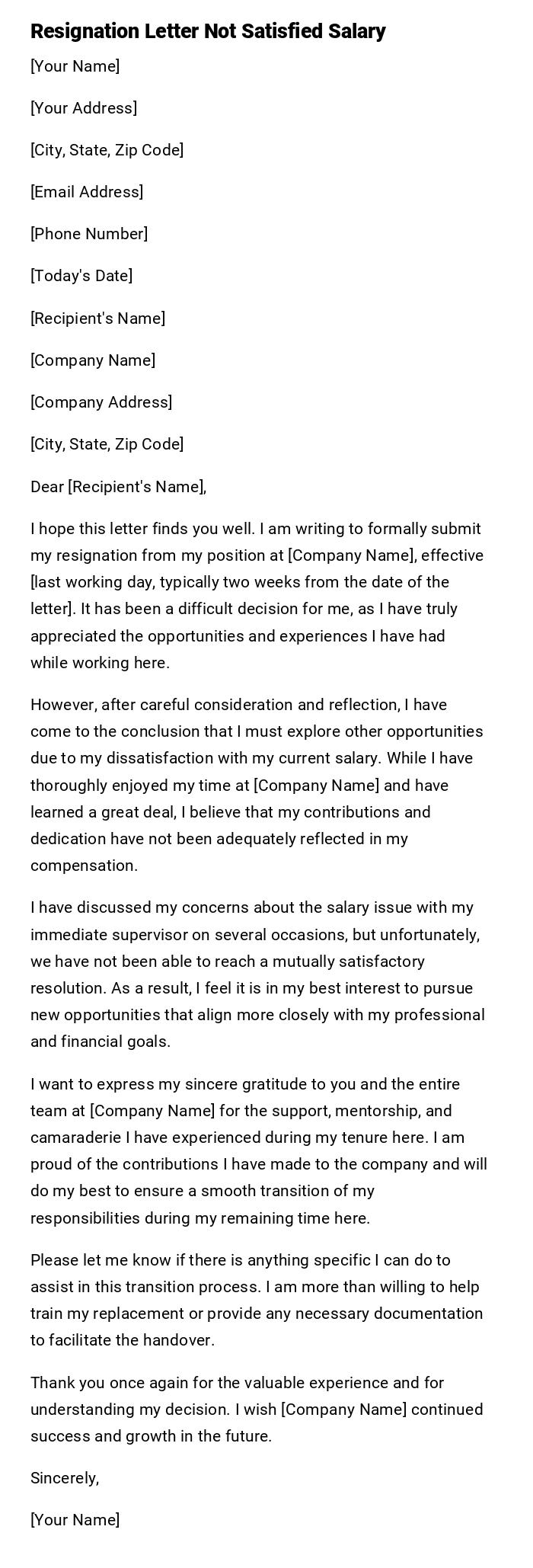
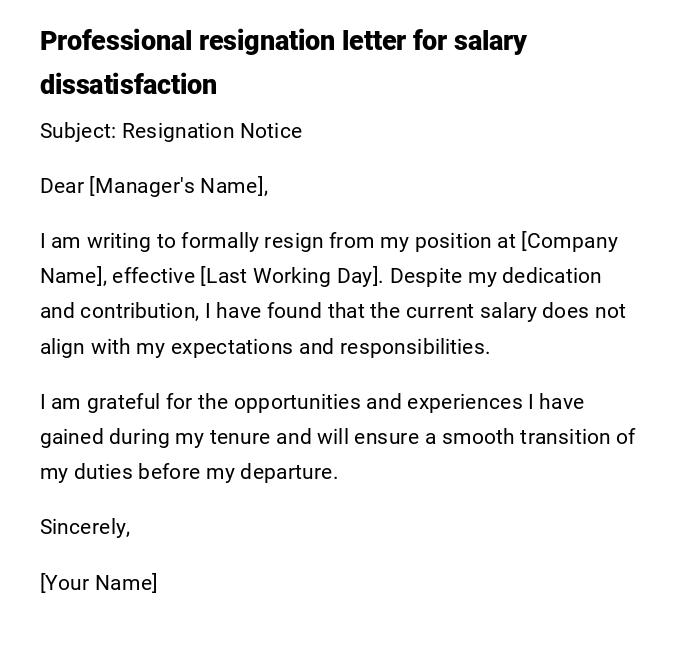
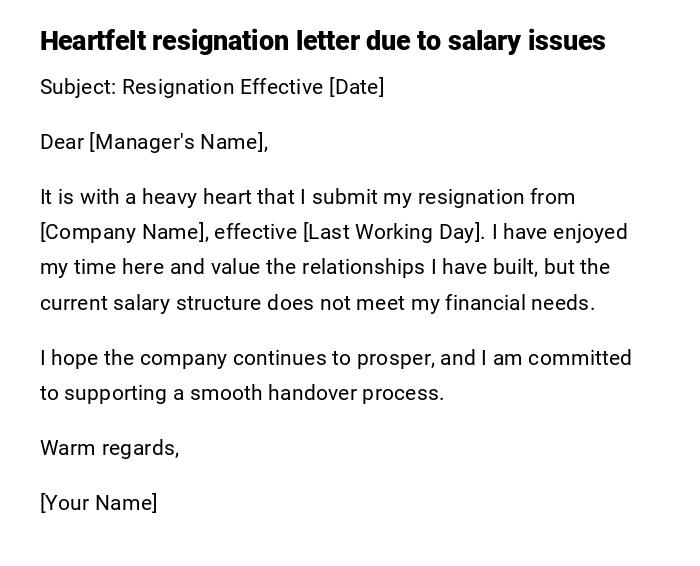
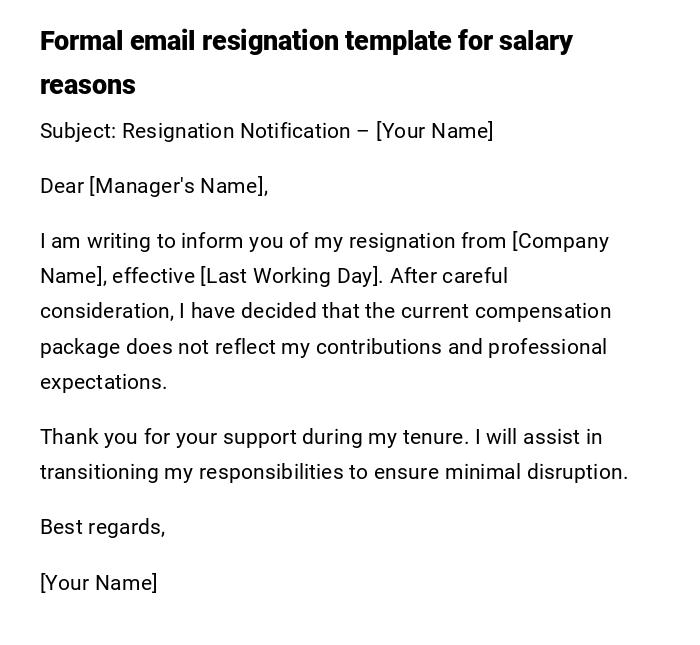
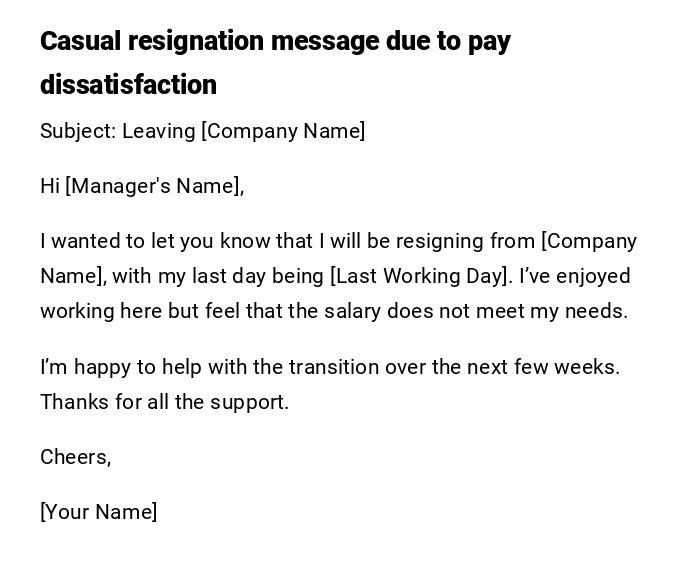
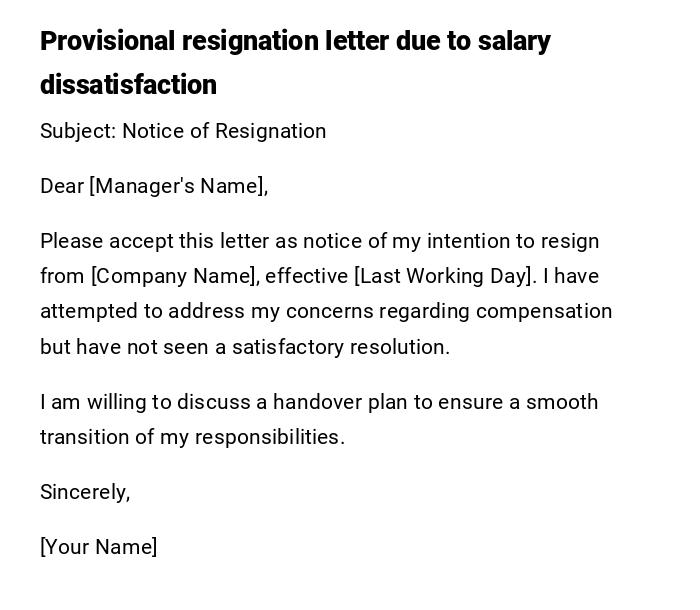
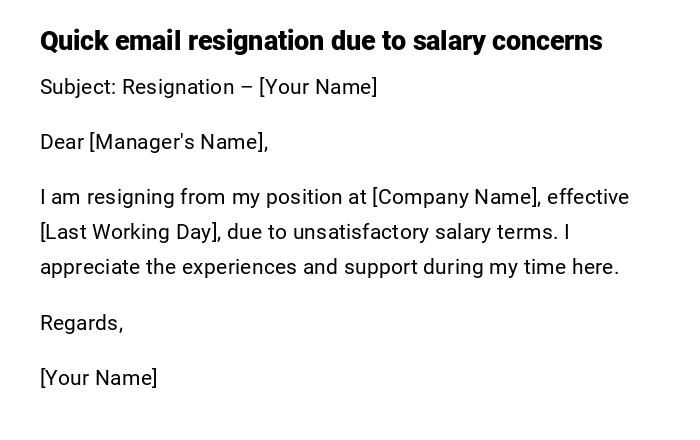

 Download Word Doc
Download Word Doc
 Download PDF
Download PDF